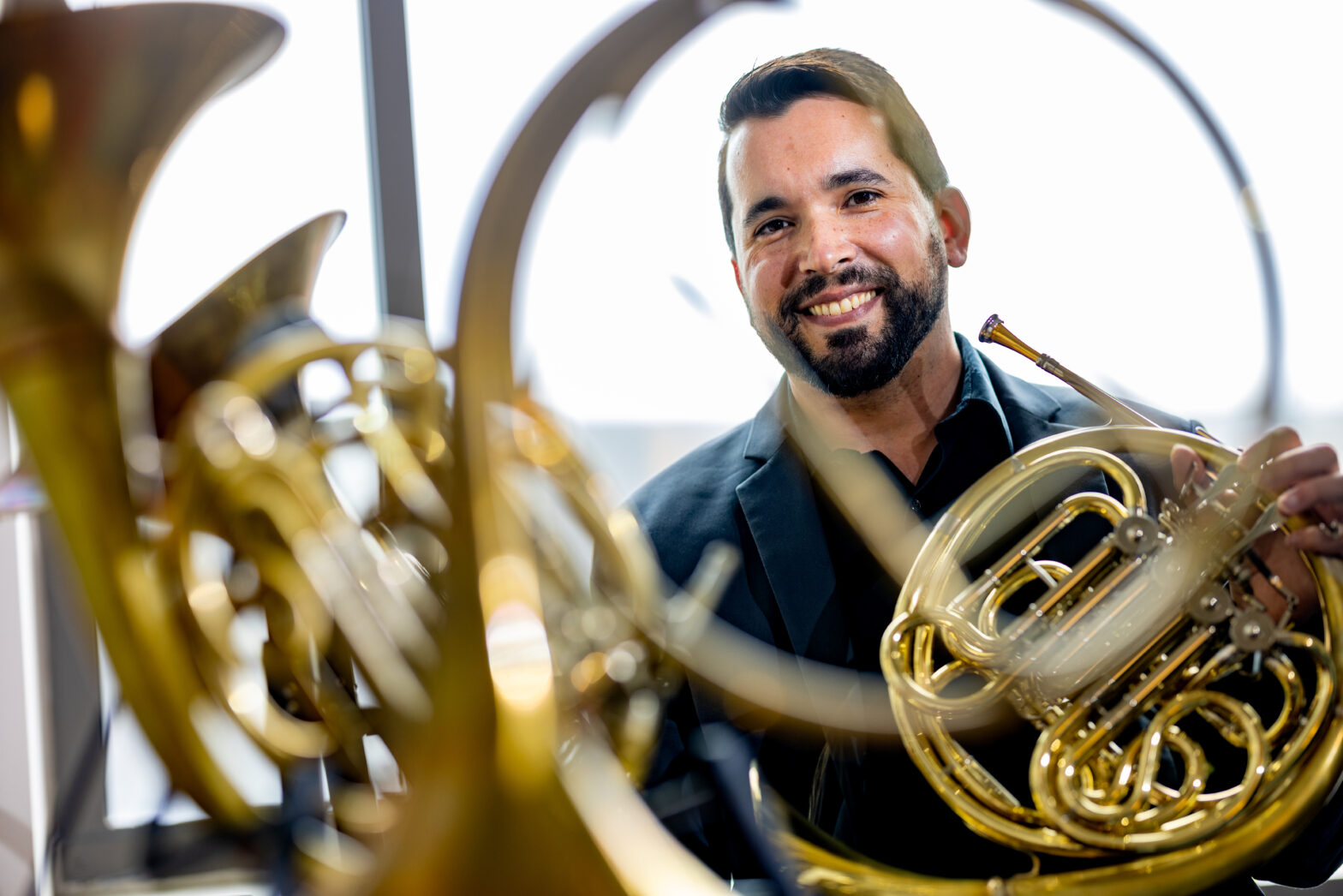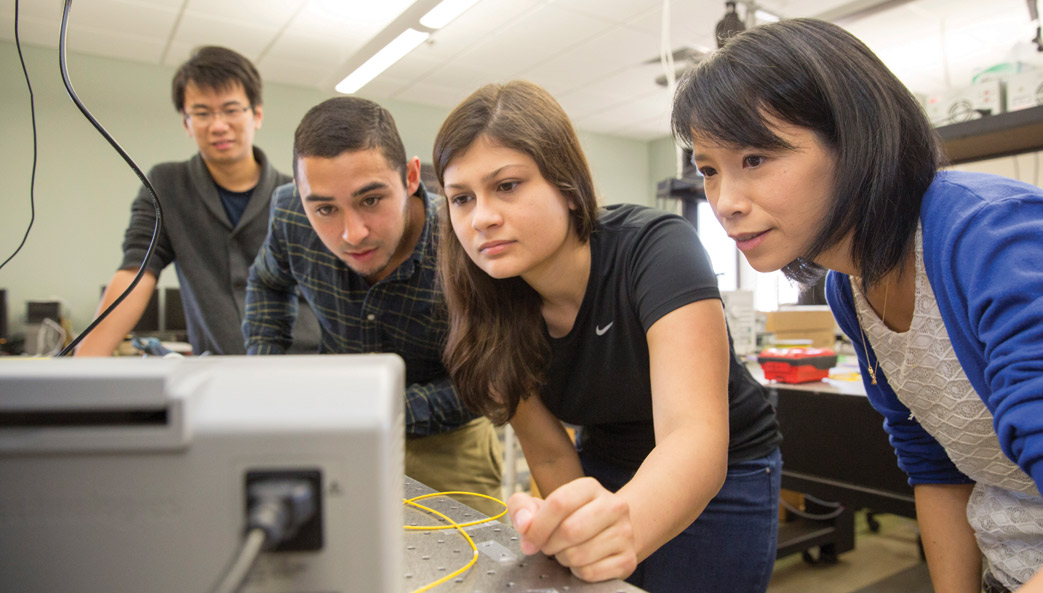James Naigus found his love for music through film. While growing up and watching movies like “Star Wars,” Naigus found himself enthralled with the John Williams score that accompanied the epic adventures of Luke Skywalker & co.
Now Naigus is an assistant professor of horn in the University of Georgia’s Hugh Hodgson School of Music, housed within the Franklin College of Arts and Sciences. In spring 2024, he received the Michael F. Adams Early Career Scholar Award at the UGA Research Awards.
He recently sat down with UGA Research and discussed his career as a performer and composer, his love for John Williams scores, and having the New York Philharmonic perform one of his pieces.
How many instruments do you play, and how long have you been playing them?
I started piano when I was 6 years old, and supposedly I asked my mom to take lessons, which surprises me considering how much I didn’t like to practice at the time. Then when I was 12, I started the horn. Most people, by the way, refer to it as French horn, but it’s really just the horn. It’s not French at all.
What drew you to the horn?
Because I’m a glutton for punishment? No, I think it was because I grew up listening to a lot of film scores, mostly by John Williams, like Star Wars and Indiana Jones. I thought the horn was a beautiful sound, and there were a thousand trumpet players in band [class] and not many horn players. So the teacher asked, “Why don’t you try this one and see what happens?”
When did you realize you wanted to pursue the horn as a career?
In high school, I was finding success playing in youth orchestras and doing competitions. At that time, being a band director was really attractive to me. I knew I was interested in teaching, at least enough to pursue it in college to see if it really did interest me. I ended up studying music education and performance at the University of Michigan. Later in my studies, I was doing my student teaching and working with middle schools and high schools and loved it. But I started composing at that point too.
I realized that, while I enjoyed teaching, I enjoyed working with slightly older and more advanced students—especially the kind of one-on-one interactions that we have in applied instruction and private lessons, rather than being in front of a classroom of 50 to 100 instrumentalists. I also loved performing and composing, and wanted to find a career that was a synthesis of all three.
You said film scores inspired you to pursue music. Which ones in particular stand out to you?
I’m a film score nerd. I love listening to film scores and looking at the scores, and even researching the impact that music has on film and vice versa. Some evenings, I find myself just pulling up a full score, going through the soundtrack, and trying to isolate different parts.
But my favorite film scores? That would be like having to pick a favorite kid. What immediately comes to mind is anything by John Williams, specifically “Jurassic Park” and “Hook.” And just today, I was listening to George Fenton’s score for the BBC documentary “Planet Earth.”
James Naigus performs his original composition “Radiant Dances, Concerto for Horn, Strings, and Percussion” with the UGA Symphony Orchestra in March 2023.
Besides film scores, what other music inspires you?
There’s so much music out there. I listen to just about everything. Who you are as a musician or as a composer is a summation of your experience, of your musical experience. So who you are as a writer is everything that you’ve read, and who I am as a musician is everything I’ve listened to. So it depends on the time. Right now, I’m really into Jacob Collier’s new album. He’s a creative young artist. I also listen to a lot of synth wave, and recently I find myself in YouTube rabbit holes of jazz pianists.
You have also worked with the New York Philharmonic as a composer. Could you describe that experience?
When I was writing the piece, I didn’t have to worry so much about how difficult to make it because they’re some of the top players in the world. Generally, my compositional style is writing more accessibly so I don’t write very difficult pieces unless someone specifically commissions that. An ensemble like that is like driving a Ferrari—although I’ve never driven a Ferrari—but I imagine that’s what it would be like, having all that power and precision.
So I could write anything and [the New York Philharmonic] would play it, which was a real treat. I actually knew some of the horn players in the orchestra and knew they would crush the parts I wrote for them.
The cool thing is I can write something and, every time it’s played, it’s different because of who’s playing it and how their voice comes through the ink on the page. But most of the music I write these days is for performers like my students, who are learning the instrument or working on musicality or working on technique.
How does research factor into your work?
Research for performance faculty is a combination of a lot of things. It’s very different than a clinical laboratory. I consider research to be honing my craft as a performer, listening to various music, and performing in different ensembles. I sub for the Atlanta Symphony Orchestra and the Charleston Symphony, and I also play with the faculty brass quintet. All that plays a vital role in my performance research in addition to my pedagogical composition.
For my compositions, I research by listening and seeing how instruments work. I try to combine technical accessibility with musical complexity in a way that helps the performers learn and grow artistically. I’m continually looking at music and re-analyzing my own approach is how to write music that makes sense for the instrument, that allows for players to be successful and to focus on certain elements while not worrying about others.
How did it feel to win the Michael F. Adams Early Career Scholar Award?
Oh, it was very humbling. I love what I do, and I don’t do it for recognition, but it was very nice to receive that. It’s also very humbling to be amidst the other award winners in all the different areas. Many of these people are working on these groundbreaking scientific projects, and I write music and perform. How does that fit in or compete, I ask myself? But then I realize that these people doing this other research are probably listening to music as they work or to unwind. So there’s a place for everything.






